Abstract
Two faecal occult blood tests, a simple chemical test Haemoccult and an immunological test, Fecatwin Sensitive/Feca EIA, were offered to 3,225 asymptomatic individuals as screening for colorectal cancer. One thousand three hundred and four (44%) completed and returned the tests and of these 126 (9.7%) were found to be positive - Haemoccult 40 (3%) and Feca EIA 106 (8.1%). Five cancers (4 Dukes' Stage A, 1 Dukes' Stage C) and 23 adenomas greater than 1 cm were detected - rates of 3.8 per 1000 persons screened and 17.7 per 1000 persons screened respectively. Of the five cancers identified 5 were Feca EIA positive and 3 were Haemoccult positive. Of the 23 adenomas greater than 1 cm diameter identified, J1 were Feca EIA positive and 20 were Haemoccult positive. Seventy-eight Feca EIA positive subjects were investigated and no neoplastic disease was identified. Whilst this sensitive immunological test increases the yield of carcinomas, the high false positive rate makes it unsuitable for population screening for colorectal cancer in its present form.
Full text
PDF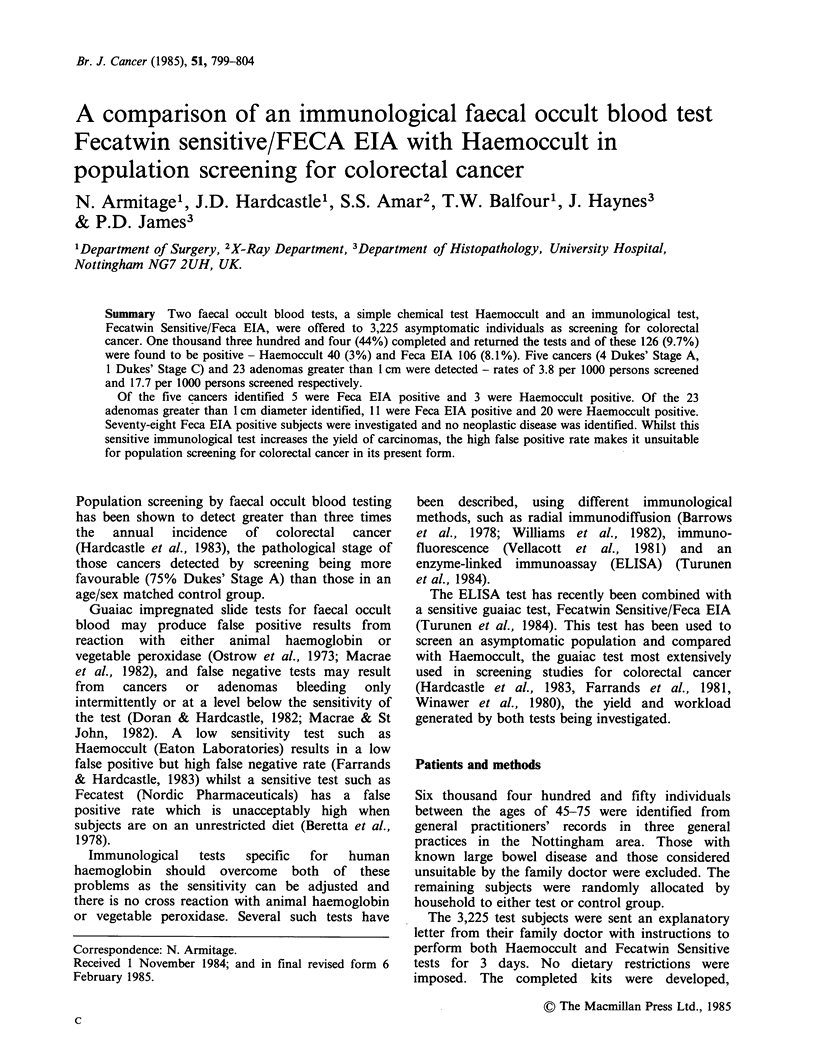
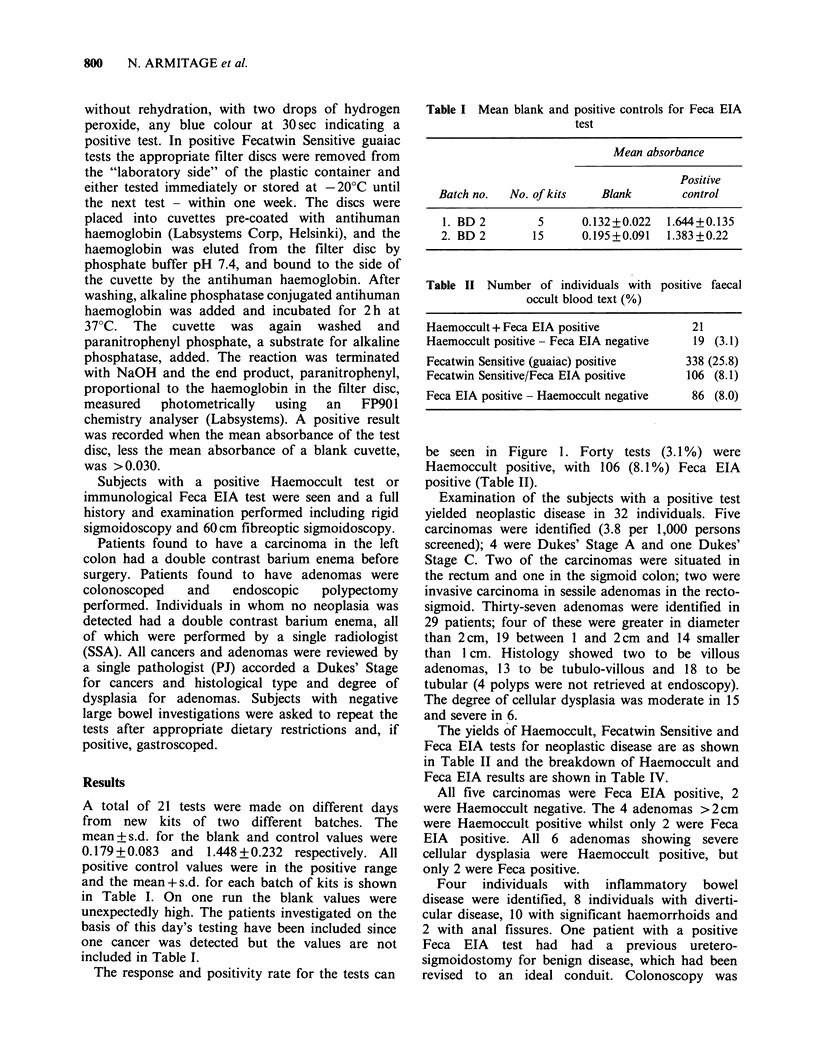
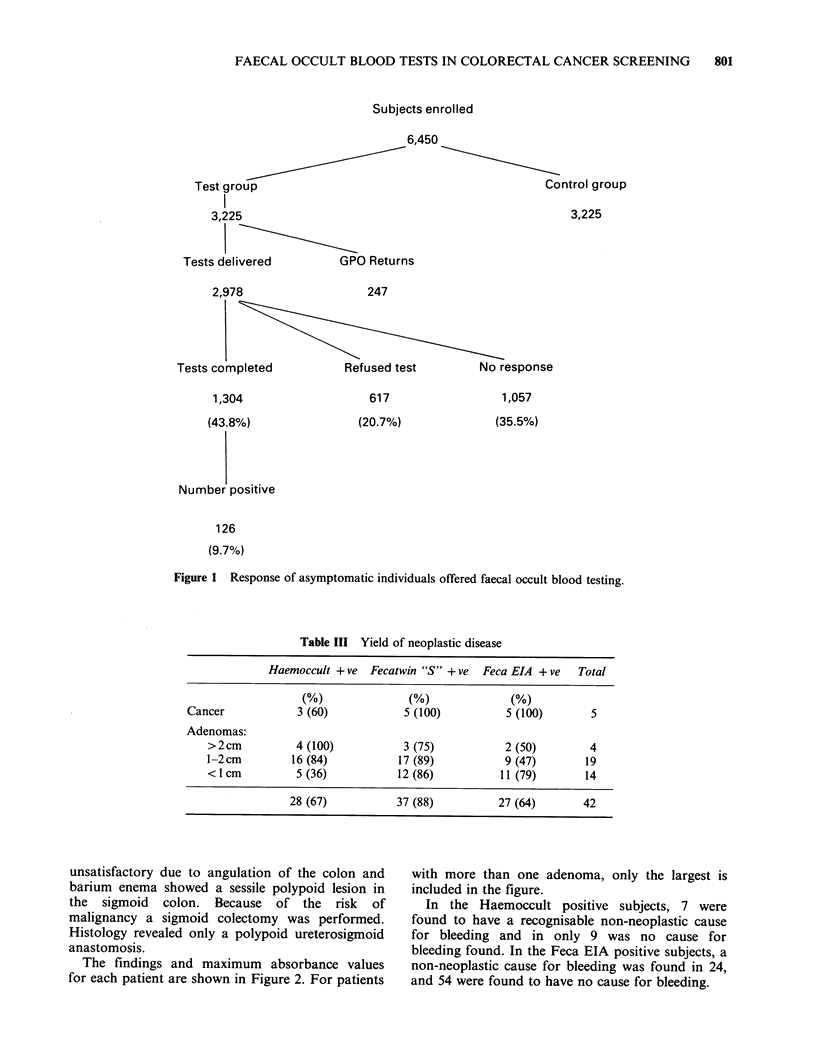
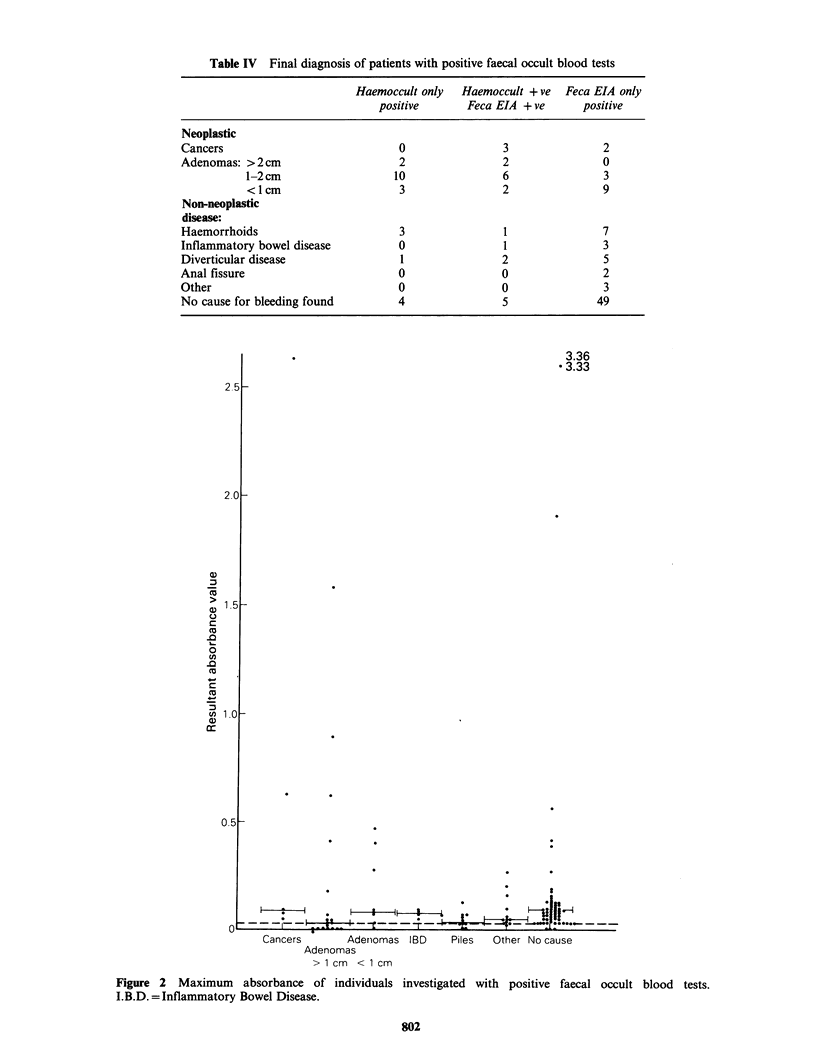
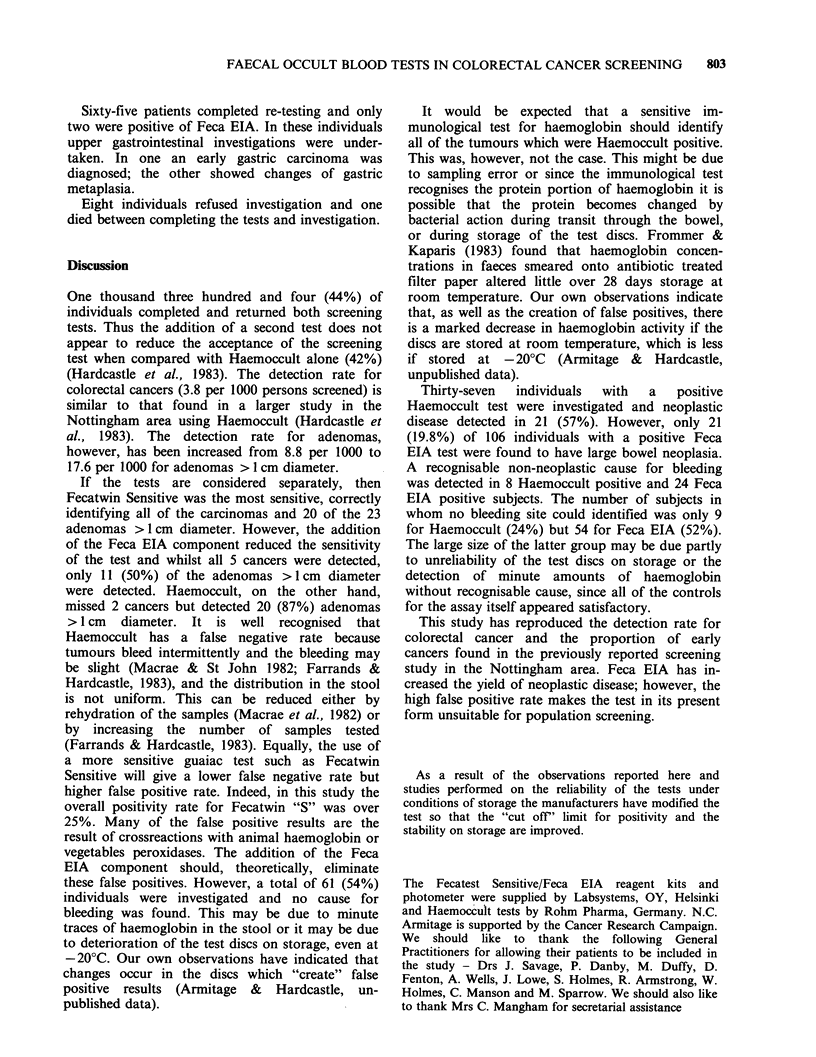
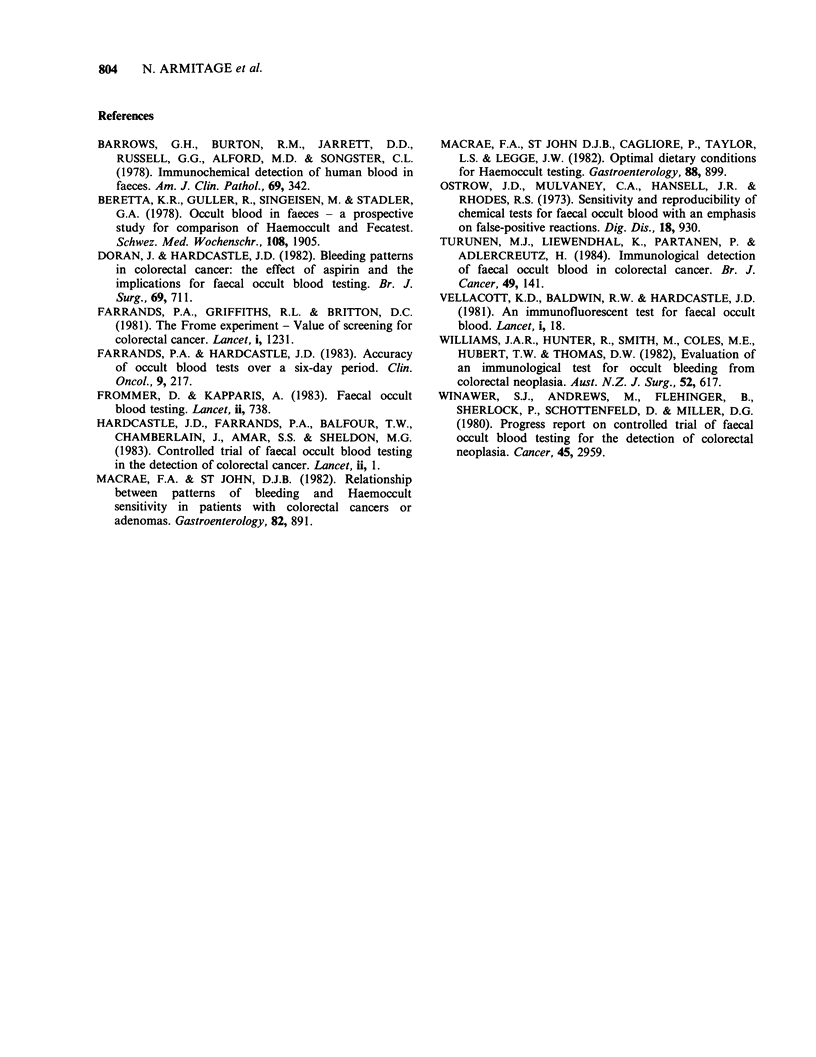
Selected References
These references are in PubMed. This may not be the complete list of references from this article.
- Barrows G. H., Burton R. M., Jarrett D. D., Russell G. G., Alford M. D., Songster C. L. Immunochemical detection of human blood in feces. Am J Clin Pathol. 1978 Mar;69(3):342–346. doi: 10.1093/ajcp/69.1.342. [DOI] [PubMed] [Google Scholar]
- Beretta K. R., Güller R., Singeisen M., Stalder G. A. Okkultes Blut im Stuhl-eine prospektive Studie zum Vergleich von Haemoccult und Fecatest. Schweiz Med Wochenschr. 1978 Dec 2;108(48):1905–1907. [PubMed] [Google Scholar]
- Farrands P. A., Griffiths R. L., Britton D. C. The Frome experiment--value of screening for colorectal cancer. Lancet. 1981 Jun 6;1(8232):1231–1232. doi: 10.1016/s0140-6736(81)92401-6. [DOI] [PubMed] [Google Scholar]
- Farrands P. A., Hardcastle J. D. Accuracy of occult blood tests over a six-day period. Clin Oncol. 1983 Sep;9(3):217–225. [PubMed] [Google Scholar]
- Macrae F. A., St John D. J., Caligiore P., Taylor L. S., Legge J. W. Optimal dietary conditions for hemoccult testing. Gastroenterology. 1982 May;82(5 Pt 1):899–903. [PubMed] [Google Scholar]
- Macrae F. A., St John D. J. Relationship between patterns of bleeding and Hemoccult sensitivity in patients with colorectal cancers or adenomas. Gastroenterology. 1982 May;82(5 Pt 1):891–898. [PubMed] [Google Scholar]
- Ostrow J. D., Mulvaney C. A., Hansell J. R., Rhodes R. S. Sensitivity and reproducibility of chemical tests for fecal occult blood with an emphasis on false-positive reactions. Am J Dig Dis. 1973 Nov;18(11):930–940. doi: 10.1007/BF01072436. [DOI] [PubMed] [Google Scholar]
- Turunen M. J., Liewendahl K., Partanen P., Adlercreutz H. Immunological detection of faecal occult blood in colorectal cancer. Br J Cancer. 1984 Feb;49(2):141–148. doi: 10.1038/bjc.1984.26. [DOI] [PMC free article] [PubMed] [Google Scholar]
- Vellacott K. D., Baldwin R. W., Hardcastle J. D. An immunofluorescent test for faecal occult blood. Lancet. 1981 Jan 3;1(8210):18–19. doi: 10.1016/s0140-6736(81)90118-5. [DOI] [PubMed] [Google Scholar]
- Williams J. A., Hunter R., Smith M., Coles M. E., Hubert T. W., Thomas D. W. Evaluation of an immunological test for occult bleeding from colorectal neoplasia. Aust N Z J Surg. 1982 Dec;52(6):617–621. doi: 10.1111/j.1445-2197.1982.tb06128.x. [DOI] [PubMed] [Google Scholar]
- Winawer S. J., Andrews M., Flehinger B., Sherlock P., Schottenfeld D., Miller D. G. Progress report on controlled trial of fecal occult blood testing for the detection of colorectal neoplasia. Cancer. 1980 Jun 15;45(12):2959–2964. doi: 10.1002/1097-0142(19800615)45:12<2959::aid-cncr2820451212>3.0.co;2-e. [DOI] [PubMed] [Google Scholar]


